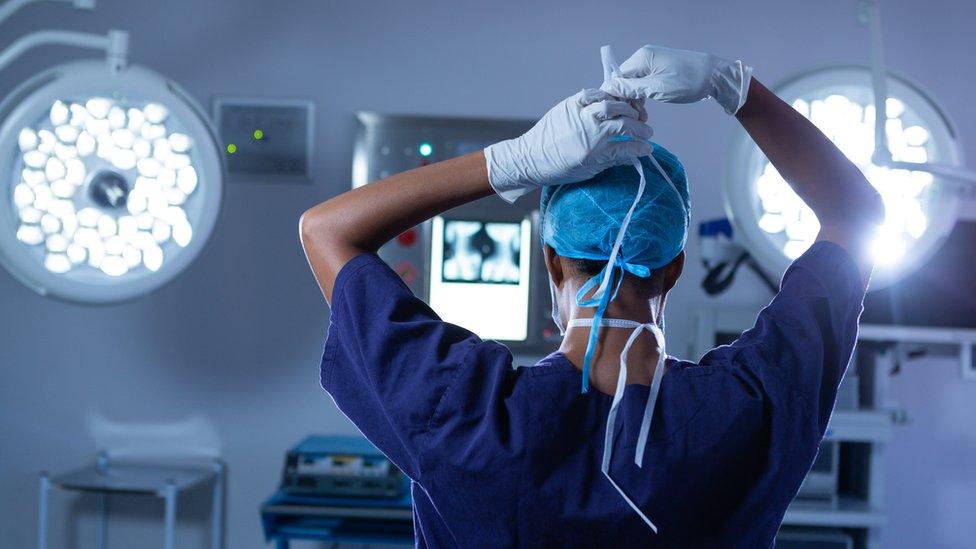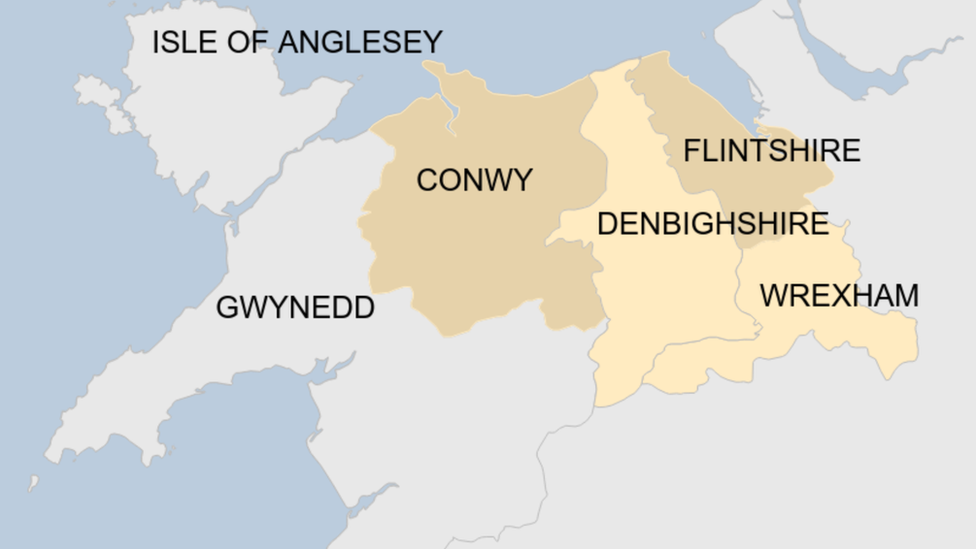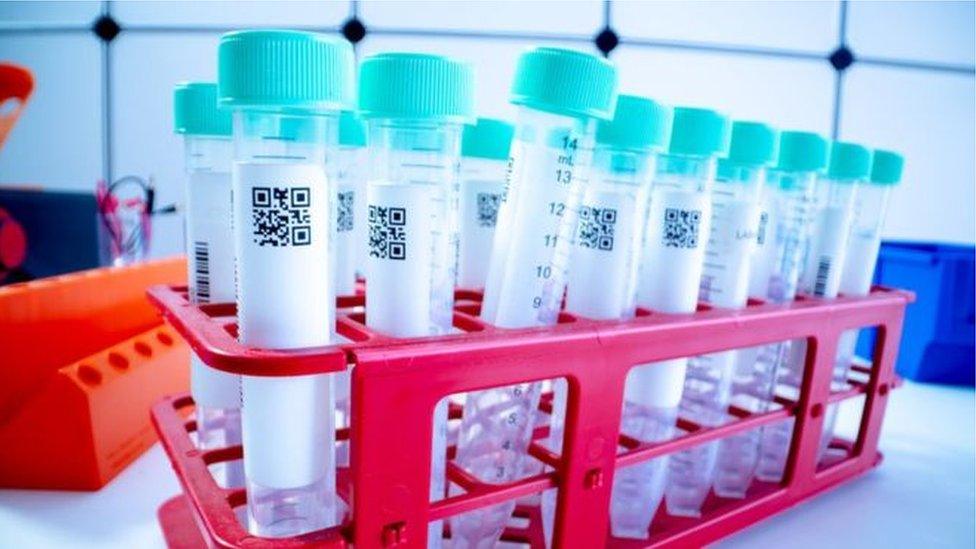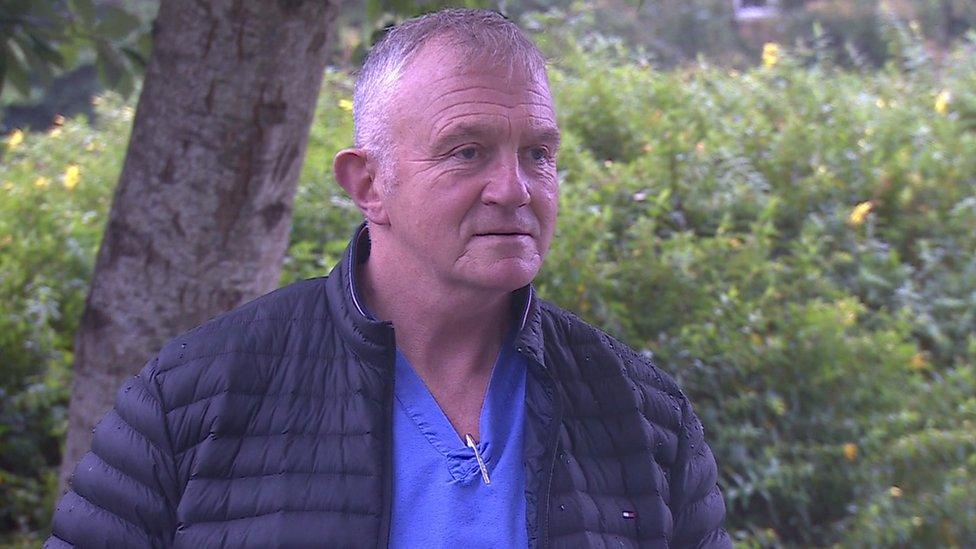Covid: Betsi Cadwaladr health board facing extremely difficult winter
- Published
Hospital porter David Morgan Jones is still recovering from his fight with Covid-19
The next few months could be extremely difficult for north Wales' NHS unless the spread of coronavirus is contained, senior doctors believe.
Betsi Cadwaladr health board has plans to deal with a patient surge while maintaining essential services.
But acting deputy medical director Kate Clark warned if the pressure becomes too great, non-emergency operations could be put on hold.
In the spring, most non-urgent treatments were postponed.
This was in anticipation of the first peak of cases and ever since, the health board has struggled to deal with a growing backlog.
"All of our services have got plans in place to understand at what point they would need to release staff to support the Covid response," said Dr Clark.
"We want to maintain our essential services as long as possible - and do more than we did the first wave - but we're prepared that if things do become really severe then we will have to look to stop doing some of that activity and switch that resource."

Hospital bosses hope to maintain services such as treatment for cancer while dealing with a second wave
Figures from Public Health Wales published on Thursday show the Betsi Cadwaladr health board area had an infection rate of 144 cases per 100,000 people in the most recent seven-day period.
This is the second highest rate in Wales, behind the Cwm Taf Morgannwg health board area.
Areas such as Flintshire, Denbighshire and Conwy also have a significant older populations.
Four council areas in north Wales are currently subject to lockdown restrictions, with people not able to leave or enter Conwy, Denbighshire, Flintshire and Wrexham without a "reasonable excuse".
There is also concern about a recent rise in cases in Gwynedd.
Dr Clark says they are monitoring the situation, adding: "What we saw in the first wave was a push from England and over the border, so Wrexham was hit first and then Glan Clwyd and then down to Gwynedd.

Anglesey and Gwynedd are the only counties in north Wales not under local lockdown rules
"We're seeing again increased activity in Wrexham and Glan Clwyd, less so in Bangor."
Dan Menzies, a respiratory physician at Glan Clwyd hospital in Denbighshire also said the number of Covid cases being seen was increasing steadily.
"It's always been in the background, even over the summer months, there's been a few patients here and there that have been admitted with Covid but now I think we're seeing those numbers increase steadily, over the last few weeks in particular," he said.
"And unlike the last four or five weeks for example, we're seeing patients with the more serious consequences. So the respiratory-type problems, the pneumonias, requiring higher levels of care and intervention."

Doctors say the virus is now better understood and treatments have been refined
Doctors are keen to stress that people should not be put off from seeking medical help and Dr Menzies said hospitals were still safe for patients.
"People develop all sorts of conditions, lung cancer is just one example, which we want to pick up as early as we can. We don't want to see people presenting late when it is untreatable and incurable," he said.
Not only is the NHS in north Wales gearing up for a potential second wave which could last longer than the first, but also the pressures of winter when other respiratory illnesses circulate more generally.
Officials want to try to keep essential services going such as cancer care.
Big challenge
They admit this will be a big challenge - particularly in terms of staffing, with some having had little rest after dealing with the first coronavirus wave.
But Dr Menzies said the NHS was now in a stronger position as the virus was now better understood.
"We've looked after a large number of people with Covid now, so straight away when they come through the door we can identify patients that might be most at risk of having problems," he said.
"And then the treatments that we're offering have become more refined over the last few months, we've managed to tailor things down.
"We know drugs that are more effective and we've got those in our armoury and in our repertoire, so we can use those in patients that we think are at risk."
- Published6 October 2020

- Published7 October 2020
